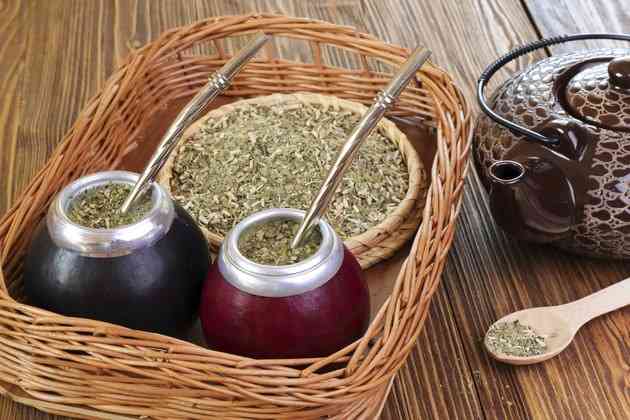Yerba Mate Tea & Cancer

Every nationality has its warm drink tradition. Americans and Europeans have their coffee houses, while the British and Asian have their teas. In South America, the tea called yerba mate plays a key role in the local culture and lifestyle. Rumors of yerba mate health benefits, such as appetite control, energy and weight loss eventually inspired American health food stores to import the product, but despite its potential benefits, some researchers link yerba mate consumption to certain types of cancers.
 Yerba mate drinking is a social activity in South America. (Image: Ferumov/iStock/Getty Images)
Yerba mate drinking is a social activity in South America. (Image: Ferumov/iStock/Getty Images)Identification
The evergreen mate tree, native to Argentina, Brazil, Paraguay, and Uruguay, grows small leaves and stems used to make yerba mate, also called ever mate tea. Yerba mate tea contains caffeine and xanthine that act as nervous system stimulants. The tea also boasts a considerable supply of antioxidants, which include vitamin B-2, vitamin B-6, vitamin C, niacin and pantothenic acid. Yerba mate's antioxidant, energy and weight control capabilities draw people to the tea, but researchers at the Division of Cancer Epidemiology and Genetics, National Cancer Institute in Bethesda, Maryland report that yerba mate contains carcinogenic polycyclic aromatic hydrocarbons that makes frequent drinkers susceptible to esophagus, larynx, lung, kidney and bladder cancer. This research was published in the May 2008 edition of "Cancer Epidemiology Biomarkers and Prevention".
Mate Culture
"Frequent drinkers" is the important qualifier. Occasional yerba mate drinkers may reap its benefits without the risks, but those who drink it non-stop throughout the day may eventually have health problems. In fact, most of the yerba mate related cancer studies took place in Uruguay, where the Uruguayans joke that yerba mate is not its national drink, but its "national addiction."
Bladder Cancer
The wide incidence of bladder cancer among Uruguayan men prompted researchers at the Hospital de Clinicas in Montevideo, Uruguay to explore the link between yerba mate tea drinking and incidence of this type of cancer. Bladder cancer, asserts lead author Eduardo De Stefani, is the fourth most malignant disease amongst Uruguayan men. De Stefani and his research team reported a direct correlation between bladder cancer and yerba mate, and warn that the risk of developing this disease increases with more frequent drinking. BioMed Central published the study in 2006.
Esophageal Cancer
The ultra-hot water temperatures used to make yerba mate tea might make drinkers susceptible to esophageal cancer, reports ABC News. Lead author PA Rolon tested this theory in Paraguay, a country known for its high incidence of esophageal cancer. Rolon and his team compared drinkers of cold, warm and very hot yerba mate, and reported that those who consumed the very hot version of the drink had a higher risk of developing esophageal cancer. The amount of yerba mate consumed in a day had no influence on the susceptibility to this type of cancer.
Lung Cancer
From January 1988 to December 1994, researchers at the Instituto de Oncologia, in Montevideo, Uruguay studied 497 cases of lung cancer. Unlike the esophageal cancer study, which showed no link between amount of yerba mate consumed and susceptibility to cancer, quantity played a significant role in this study. Lead author De Stefani reported that frequent yerba mate drinkers increased their lung cancer risk by 1.6 percent. "Cancer Epidemiology Biomarkers and Prevention" published the study in July 1996.




